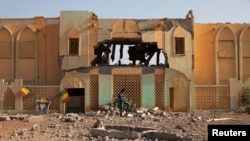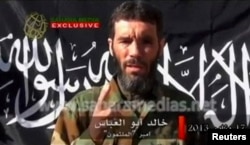The United Nations Security Council is considering a recommendation by Secretary-General Ban Ki-moon to create two forces in Mali -- one, a peacekeeping operation, and a separate military force to confront Islamist militants.
Former U.S. ambassador to Mali Vicki Huddleston says neighboring Algeria must play a key role in any long-term stabilization plan.
In an interview on VOA's Press Conference USA, Huddleston said Algeria is the only country in the region with the military capacity and the air and land mobility to take the lead in ridding Mali of Islamist militants.
She noted these particular militants have their roots in Algeria, and contributed to unrest there before becoming active in Mali.
"Sooner or later Algeria will have to do what it takes. Algeria is responsible in that al-Qaida in the Islamic Maghreb, [Mokhtar] Belmokhtar, [Abdelhamid] Abou Zeid, [Abdelmalek] Droukdel, who is even now the leader, is in Algeria. This is an Algerian, Salafist, militant movement. So, they went in to Mali and restarted the Algerian civil war in Mali," said Huddleston.
Huddleston said Algeria has shown some "hesitancy" over its involvement in Mali's conflict. But she added, she does not believe Algeria can ignore the unrest at its southern border.
"United Nations [troops] generally don’t fight. They are peacekeepers, not peacemakers. So if that is going to happen, then Algeria should be the lead because Algeria has the capacity to fight in that area, to bring Chad, and Niger, and Libya, and Mauritania together," said Huddleston.
Analysts say Algeria has been working in the background since the start of the French-led intervention in Mali in January. They say Algiers has opened its airspace, closed its border with Mali and helped with diplomatic efforts to reunite Malian factions and ethnic groups.
But Congressional Research Service Africa and Maghreb analyst Alexis Arieff said Algeria has also objected to a Western military presence in what it considers its backyard.
"I think that Algeria’s position is a bit ambiguous, and that is normal when you consider that Algeria’s senior decision-making apparatus is opaque and features apparent competition between various actors within the government and security apparatus," said Arieff.
Mali's crisis began last year when soldiers overthrew the president, a move that allowed Islamists to seize control of the country's north.
The crisis spilled over into Algeria in January when Islamist militants seized hostages at a remote desert natural gas complex. Dozens of foreign workers were killed during the siege. Algerian Prime Minister Abdelmalek Sellal said the militants had planned the attack in neighboring Mali.
But despite the threat of a continued spillover, analyst Riccardo Fabiani of the Eurasia Group, a New York-based political risk assessment firm, said he does not think Algeria will step up to a prominent military role in securing Mali.
"I think the Algerians are completely reluctant to do this. This is part of their tradition of their foreign policy and there is really no discussion or debate within Algeria on this," said Fabiani.
He said there is also a problem of perception when it comes to the Malian crisis.
"For the French, this is basically just a terrorist/security problem in the region. For the Algerians, this is more of a social long-term economic problem that has happened before, that is recurrent and that the Algerians think needs to be addressed by political and diplomatic means rather than by military means," he said.
He said Algerians do think they can be effective at using their presence in the region to help broker a diplomatic agreement.
Meanwhile, former U.S. ambassador Huddleston said a three-pronged approach is needed to address Mali's turmoil. First, she said, defeat al-Qaida elements. Second, address the grievances of northern Mali's population. And third, repair and mend Mali’s government.
"Algeria is absolutely essential to all three," said Huddleston.
Huddleston said the multinational effort to help stabilize Mali is off to a "good start." She said France has done the right thing with its intervention. She also praised Chad and the other African countries that have assisted in the effort.
Huddleston said what Mali needs in the long run is a fully functioning military and a government that is representative of all of the people.
Former U.S. ambassador to Mali Vicki Huddleston says neighboring Algeria must play a key role in any long-term stabilization plan.
In an interview on VOA's Press Conference USA, Huddleston said Algeria is the only country in the region with the military capacity and the air and land mobility to take the lead in ridding Mali of Islamist militants.
She noted these particular militants have their roots in Algeria, and contributed to unrest there before becoming active in Mali.
"Sooner or later Algeria will have to do what it takes. Algeria is responsible in that al-Qaida in the Islamic Maghreb, [Mokhtar] Belmokhtar, [Abdelhamid] Abou Zeid, [Abdelmalek] Droukdel, who is even now the leader, is in Algeria. This is an Algerian, Salafist, militant movement. So, they went in to Mali and restarted the Algerian civil war in Mali," said Huddleston.
Huddleston said Algeria has shown some "hesitancy" over its involvement in Mali's conflict. But she added, she does not believe Algeria can ignore the unrest at its southern border.
"United Nations [troops] generally don’t fight. They are peacekeepers, not peacemakers. So if that is going to happen, then Algeria should be the lead because Algeria has the capacity to fight in that area, to bring Chad, and Niger, and Libya, and Mauritania together," said Huddleston.
Analysts say Algeria has been working in the background since the start of the French-led intervention in Mali in January. They say Algiers has opened its airspace, closed its border with Mali and helped with diplomatic efforts to reunite Malian factions and ethnic groups.
But Congressional Research Service Africa and Maghreb analyst Alexis Arieff said Algeria has also objected to a Western military presence in what it considers its backyard.
"I think that Algeria’s position is a bit ambiguous, and that is normal when you consider that Algeria’s senior decision-making apparatus is opaque and features apparent competition between various actors within the government and security apparatus," said Arieff.
Mali's crisis began last year when soldiers overthrew the president, a move that allowed Islamists to seize control of the country's north.
The crisis spilled over into Algeria in January when Islamist militants seized hostages at a remote desert natural gas complex. Dozens of foreign workers were killed during the siege. Algerian Prime Minister Abdelmalek Sellal said the militants had planned the attack in neighboring Mali.
But despite the threat of a continued spillover, analyst Riccardo Fabiani of the Eurasia Group, a New York-based political risk assessment firm, said he does not think Algeria will step up to a prominent military role in securing Mali.
"I think the Algerians are completely reluctant to do this. This is part of their tradition of their foreign policy and there is really no discussion or debate within Algeria on this," said Fabiani.
He said there is also a problem of perception when it comes to the Malian crisis.
"For the French, this is basically just a terrorist/security problem in the region. For the Algerians, this is more of a social long-term economic problem that has happened before, that is recurrent and that the Algerians think needs to be addressed by political and diplomatic means rather than by military means," he said.
He said Algerians do think they can be effective at using their presence in the region to help broker a diplomatic agreement.
Meanwhile, former U.S. ambassador Huddleston said a three-pronged approach is needed to address Mali's turmoil. First, she said, defeat al-Qaida elements. Second, address the grievances of northern Mali's population. And third, repair and mend Mali’s government.
"Algeria is absolutely essential to all three," said Huddleston.
Huddleston said the multinational effort to help stabilize Mali is off to a "good start." She said France has done the right thing with its intervention. She also praised Chad and the other African countries that have assisted in the effort.
Huddleston said what Mali needs in the long run is a fully functioning military and a government that is representative of all of the people.












